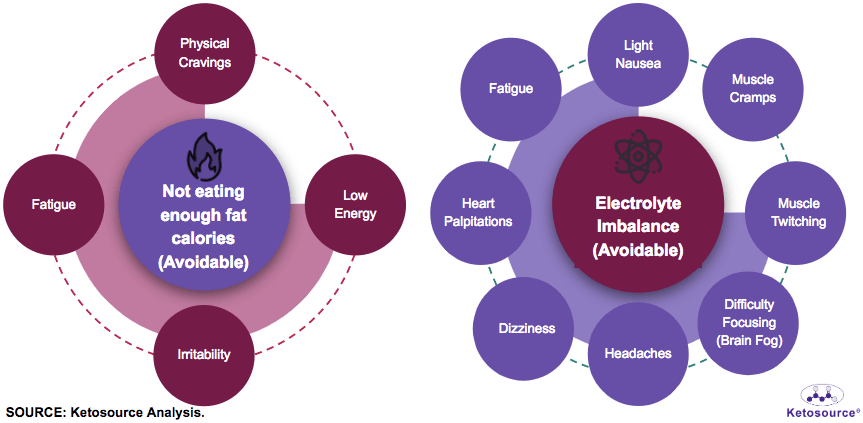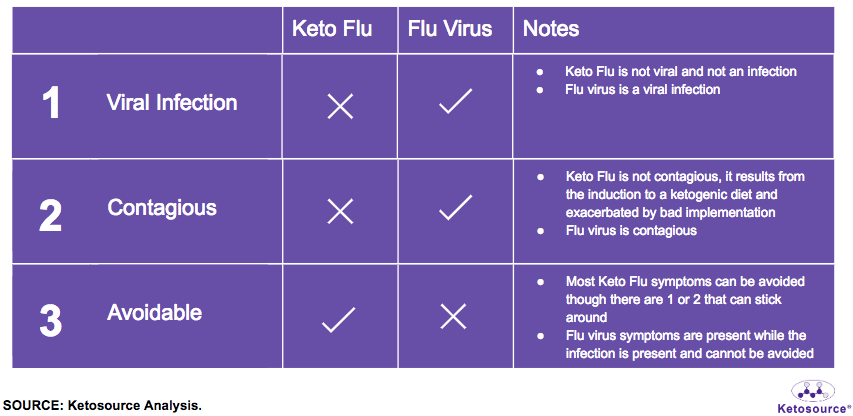In this article, we will discuss the symptoms of ‘Keto Flu’. You will learn how to compare those with other illnesses such as the flu virus.
Read on as we learn about:
- Why Does ‘Getting into Ketosis’ Give You Symptoms?
- How Long Do Keto Flu Symptoms Last?
- Dealing with Keto Flu Symptoms
- What Symptoms are Not Keto Flu?
- The Difference Between Keto Flu and Flu Virus
Why Does ‘Getting into Ketosis’ Give You Symptoms?
What Symptoms to Expect When Starting a Ketogenic Diet
First of all, the state of ketosis is not generally symptomatic[note]Palgi, A., Read, J. L., Greenberg, I., Hoefer, M. A., Bistrian, B. R., Blackburn, G. L. (1985). Multidisciplinary treatment of obesity with a protein-sparing modified fast: results in 668 outpatients. American Journal of Public Health, 75(10), 1190–1194.[/note].
Most symptoms that arise are due to carbohydrate restriction and decreasing insulin levels[note]Hamwi, G. J., Mitchell, M. C., Wieland, R. G., Kruger, F. A., Schachner, S. S. (1967).Sodium and potassium metabolism during starvation. American Journal of Clinical Nutrition, 20(8), 897–902.[/note]. Due to a decrease in insulin, sodium leaves the kidneys [note]Volek JS, Phinney SD. (2011). The Art and Science of Low Carbohydrate Living. Beyond Obesity Publishing, Miami FL. PP 41.[/note].
This is the “natriuresis of fasting”[note]Sigler, M. H. (1975).The mechanism of the natriuresis of fasting. The Journal of Clinical Investigation, 55(2), 377–87.[/note]. Insulin is a fat storing hormone. As the levels of insulin drop, the body shifts from using glucose to fat and ketones, as a main source of energy.
As a result, symptoms such as a headache, dizziness, and digestive upset may occur when entering ketosis[note]Harvey, C. J. D. C., Schofield, G. M., & Williden, M. (2018). The use of nutritional supplements to induce ketosis and reduce symptoms associated with keto-induction: a narrative review. PeerJ, 6, e4488.[/note].
How Long Do Symptoms Last?
Symptoms can occur between Day 1 and Day 4 of starting a keto diet. This is due to a decrease in the number of carbs eaten. A keto diet consists of 20g total carbs per day while in contrast, the average daily intake is 250g daily. Moving from a standard diet can mean eating up to 80% fewer carbs per day.
Therefore, taking steps ahead of time, to prevent the onset of these negative symptoms is important for a smooth move into ‘ketosis’. It will also improve the chances of staying on the diet long term.
Furthermore, if prepared, these short-term symptoms should not arise at all. This will make the journey into ‘fat loss ketosis’ much easier[note]Hartman, A. L., Vining, E. P. G. (2007).Clinical Aspects of the Ketogenic Diet. Epilepsia, 48(1), 31–42.[/note]. Let’s have a brief look at Keto Flu symptoms and how they differ to symptoms of other illnesses.
Dealing with Keto Flu Symptoms
‘Keto Flu’ is better known as ‘Keto Induction’. It presents as a mixture of symptoms similar to those of the viral flu. For the most part, they are a result of a poorly enforced keto diet. How to prevent Keto Flu symptoms can be quite unique and will differ between people. However, there are some steps you can take to alleviate symptoms. These steps have three main areas of focus:
- Electrolytes: If you experience symptoms such as lightheadedness, headache, heart palpitations or fatigue you may need to balance or increase the amount of sodium, potassium and magnesium in your body
- Fat Levels: If you encounter hunger cravings, irritability, nausea, diarrhoea or fatigue you may need to increase or decrease the levels of fat that you are taking. There are also supplements available that can help to alleviate these
- Rest: Depending on a few other factors, some people may need to rest more in the first few days of the keto diet, as the body moves into a state of ‘ketosis’
Less Common Symptoms
There are other, less common symptoms of Keto Flu. For example, constipation (from reduced food volume and fibre intake), halitosis (bad breath), muscle cramps, and a localised rash[note]Yancy, W. S. (2004). A Low-Carbohydrate, Ketogenic Diet versus a Low-Fat Diet To Treat Obesity and Hyperlipidemia. Annals of Internal Medicine, 140(10), 769.[/note] may also occur.
These symptoms will pass with one or a mix of the three areas of focus stated above, electrolytes, altered fat levels and rest. With that being said, how do you know if you have the Keto Flu or a stomach bug?
Avoidable Keto Flu Symptoms

Non Keto Flu Symptoms
First of all, once a ‘well formulated keto diet’ is followed, symptoms of the Keto Flu should not occur. A ‘well formulated keto diet’ includes a wide range of nutrient dense proteins, fats and fibres. This varied intake will provide the body with an array of vitamins and minerals that are required to maintain optimum function.
Second of all, it is vital to vary your foods to cover all nutrients so that when symptoms arise, they can quickly be identified as symptoms of another illness.
Above all, if you encounter negative symptoms, the first step is to contact and consult with your doctor.
Now, let’s have a look at the most common questions on symptoms not associated with the Keto Flu and how to deal with them.
Does Keto Flu Cause Vomiting or Nausea?
For most people, Keto Flu does not cause nausea or vomiting. However, if symptoms come on quickly and are moderate to severe in nature, contact your doctor. Furthermore, if you encounter prolonged diarrhoea or signs of fever, contact your doctor straight away to rule out other causes.
Having said that, for a small number of people, the increased amount of fat in the diet can cause short-term fat intolerance[note]Duchowny, M. S. (2005). Food for thought: the ketogenic diet and adverse effects in children. Epilepsy Currents, 5(4), 152–4.[/note]. This may result in low levels of nausea, vomiting and digestive issues such as diarrhoea. However, once the fat levels are altered, symptoms should resolve almost straight away.
Does Keto Flu Cause Diarrhoea?
Firs of all it is important to note that Keto Flu does not cause diarrhoea for people following a ‘well-formulated ketogenic diet’. Furthermore, by using the tools, mentioned above it is possible to prevent the onset of symptoms. However, if you experience diarrhoea, it is advised to consume a wide range of nutrient-dense foods. Alongside this, it is vital to keep your electrolytes in balance and stay hydrated.
Second of all, for those starting the keto diet, it is suggested to introduce fat slowly into the diet in order to test your fat tolerance levels. This will help to avoid any possible digestive issues.
Does Keto Flu Cause Fever and Chills?
Keto Flu does not cause fever or chills. A fever is characteristic of a viral infection such as ‘Influenza’. It may also be characteristic of a bacterial infection. However, bacterial infections are not associated with starting a keto diet. It is important to consult your doctor if you have a fever or chills.
Does Keto Flu cause Coughs, Sneezes and Running Noses?
Keto Flu does not cause coughs, sneezes or running noses. In contrast, these symptoms are characteristic of viral infections such as ‘Influenza’ or the common cold. Therefore, they are not associated with the transition into ‘ketosis’.
Does Keto Flu Cause Joint Pain?
Keto Flu does not cause Joint Pain. Joint Pain may occur for many reasons, mainly from injury, inflammation or autoimmune conditions. It can also occur as a result of a vitamin or mineral/electrolyte deficiency. In contrast, following a ‘well formulated keto diet’ may in fact decrease pain [note]Masino, S. A., & Ruskin, D. N. (2013). Ketogenic diets and pain. Journal of Child Neurology, 28(8), 993–1001.[/note], inflammation[note]Pinto, A., Bonucci, A., Maggi, E., Corsi, M., & Businaro, R. (2018). Anti-Oxidant and Anti-Inflammatory Activity of Ketogenic Diet: New Perspectives for Neuroprotection in Alzheimer’s Disease. Antioxidants (Basel, Switzerland), 7(5).[/note] and improve autoimmune conditions[note]Storoni, M., Plant, G. T., Storoni, M., & Plant, G. T. (2015). The Therapeutic Potential of the Ketogenic Diet in Treating Progressive Multiple Sclerosis. Multiple Sclerosis International, 1–9.[/note]. As a result, keto diets are anti-inflammatory by nature and therefore may improve and resolve pain in the joints.
Does Keto Flu cause Body Aches?
Generally, for most people, Keto Flu does not cause body aches and pains. However, there is a research study that showed a small percentage of people on a keto diet experienced back pain[note]Westman, E. C., Yancy, W. S., Mavropoulos, J. C., Marquart, M., McDuffie, J. R. (2008). The effect of a low-carbohydrate, ketogenic diet versus a low-glycemic index diet on glycemic control in type 2 diabetes mellitus. Nutrition Metabolism, 5(1), 36.[/note] though this was not during the transition into ‘ketosis’.
[optin-monster-shortcode id=”dlvprwfvbihx0igacoxu”]Withdrawal Symptoms from Caffeine and Carbs Reduction
Some symptoms of withdrawal can be felt when moving into ‘ketosis’ between Day 1 and Day 4. Due to the decreased intake of refined sugars, carbs and even caffeine, negative symptoms can occur. As a result, nausea, vomiting, joint pain, diarrhoea and fever[note]Juliano, L. M., Griffiths, R. R. (2004). A critical review of caffeine withdrawal: empirical validation of symptoms and signs, incidence, severity, and associated features. Psychopharmacology, 176(1), 1–29.[/note] can be encountered.
Therefore, these symptoms are not characteristic of Keto Flu. They will resolve over time once the body has moved into a state of ‘ketosis’. Furthermore, once in ‘ketosis’, the body will be using an alternate pathway to provide energy as fuel and symptoms should then pass.
The Difference Between Keto Flu and Flu Virus
Keto Flu vs Flu Virus

First of all, the Keto Flu does not arise as a result of a viral infection. It occurs during the switch from glucose to fat and ketone usage for energy. Under the term Keto Flu there are a series of negative symptoms. Some of these symptoms such as headaches and dizziness are similar to a viral infection like the Flu Virus.
Second of all, though some of these symptoms are alike in nature, they are not part of the same ‘Flu’. The symptoms encountered during the move into ‘ketosis’ cannot be passed from one person to another. However, they can be treated or totally avoided with the correct approach mentioned above.
Lastly, if you encounter negative symptoms as you start your keto diet it is always best to troubleshoot to find the best solution. Most symptoms can be improved with the right tools and techniques.
Finally, if you encounter symptoms unique to the flu on your keto diet, contact your doctor.
Summary: The Takeaways
- Keto Flu has nothing to do with the Flu Virus: They have similar symptoms sometimes, but this is just coincidence. Keto flu is not an illness.
- Most Keto Flu symptoms are from a poorly implemented keto diet: These can be improved and even avoided with the right dietary corrections. Use this step-by-step course to troubleshoot and correct your symptoms.
- You may just have flu at the same time: If you follow a well-formulated ketogenic diet and still have symptoms you may just have the flu, coincidentally, at the same time. Contact your doctor as usual for a check up to make sure this isn’t the case.